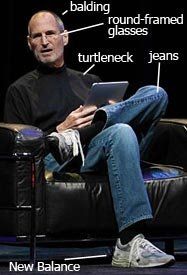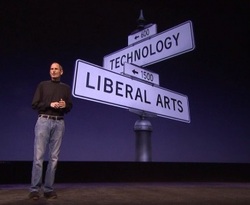
Interesting day – reading the news that the world’s largest PC maker, HP has given up on it’s PC business, along with recently released TouchPads and related products.
So for some time, the pundits have been talking about a ‘post PC’ era – mostly on the heels of Apple’s success with iPads and iPhones (full disclosure – I worked at an ad agency that helped launch the Macintosh 512K and have been a big Mac guy ever since).
So today, it all came together in an article on TechCrunch titled “HP to Apple: You Win“.
And later, banging through the desert on the mountain bike, I tried to make sense of this all in relation to my clients and the Enterprise Software industry as a whole.
One thing that hit me was the comments from techies, IT SysAdmin guys, network experts, you consistently read things like:
- Both apple and android have their major flaws. One is extremely restrictive on hardware and the other suffers from a serious fragmentation problem that prohibits many devices to not run certain software….
- If the post-PC world means everyone has to use OSX, can it never happen please?
- Actually, given that I build my own desktops, I’d put the computer I’m on now head to head with any 2 Macs put together, especially when I’m booted into Linux 🙂 Macs have great design, but at the end of the day, it’s a really pretty UNIX box…
And that’s when it hit me – it’s basically a language problem.
I work with techie guys, brilliant programmers, developers, software coders – and they truly are brilliant, often genius level at what they do. These guys look at my clients, the end users, as ignorant simpletons who do nothing but jam up perfectly designed software systems with ill-timed mistakes, bad input and illogical activities.
Similarly, my clients – many of them are brilliant entrepreneurs who’ve created millions manufacturing innovative products and designing intricate supply chains that drive cost out while increasing value each step of the way. They’re really fun people to know, and I find it fascinating to see how they’ve come up with so many ways to create excellence out of often, next to nothing. And they see the techie guys as a necessary evil, somewhat like lawyers, accountants or economists – when techies speak you know they’re saying something important, but for the life of you, you don’t really know what it is.
So back to Steve Jobs – in his post PC Credo he says…
“And our experience and every bone in our body says that that is not the right approach to this. That these are post-PC devices that need to be even easier to use than a PC. That need to be even more intuitive than a PC. And where the software and the hardware and the applications need to intertwine in an even more seamless way than they do on a PC.”
Easy – Intuitive – “I just want something that works”…
Which took me back to a recent argument I was having while doing demo prep for an ERP sale. I was working with a really brilliant techie guy who would be doing the demo. He wanted to show the client a really cool feature that our software did in the warehouse – and our conversation went something like:
TechieGuy: We have to show this, no one else in the industry can do this, once the client sees this, we’ll win the deal for sure.
Gene: Umm, I think we need to stick to showing them what they’ve asked to see.
TechieGuy: You’re kidding? Do you know how hard this was to develop? Do you know how cool this is? No one can touch it – it’s the leading put-away technology in any warehouse management system.
Gene: Umm, but they don’t run the warehouse, they use a 3PL (Third Party Logistics) to handle everything once it’s manufactured.
TechieGuy: (exasperated) But they wouldn’t HAVE TO if they had this software!
And logically, he was right – but showing warehouse management advances to a group of people who have no experience, nor interest, nor any reference point concerning warehouses is another teaching a pig to sing moment.
And that’s what is wrong with ERP today – regardless of the company or technology – it’s run by brilliant techies who have come up with wonderful advances that are phenomenal in scope and complexity – yet the clients are just looking for ‘something simple that just works.’
I make the point that any feature in a software demo that takes more than two screens to demonstrate is a feature that sucks – no matter how well it works.
Users don’t care how many features and bells software has, only that it do the things that they specifically need, now, and easily. Think of the iPhone. It doesn’t need to be configured for months for each user. It doesn’t have a multi week training program (it barely has instructions in the box). It’s just intuitively easy to pick up, walk away with and use – of course the user finds more uses in the days to come, but on day one, they’re at least making calls. No doubt there is complexity there – the technology in the iPhone – it’s just seamless to the user, under the covers, hidden from sight.
My job, as I see it, is the translator between the techies and the clients. I have to truly understand what the client needs. I have to truly communicate to the techies how to deliver it. It doesn’t matter which ERP system or which technology – that’s irrelevant (I closed three Epicor deals a few years ago and hadn’t seen the software in over 10 years- but that’s another topic.)
The point I try to get across to the techie guys is this: Users seem completely illiterate from a techie standpoint. You can’t understand how these users could be so dumb. These guys are just ‘foreign‘. I point out to the techie guys, you’ve just described how you come across to users.
When you tell a doctor you have a headache, he doesn’t describe the vascular system, nervous system and brain structure, he doesn’t whip out a 142 slide PowerPoint, he hands you two aspirin. (Without a two-hour discussion of how aspirin works.)
So I’m working for an ERP publisher recently. (Doesn’t matter which one, this example could apply to any or all.) Great technology. Leading edge. Award winning. Only drawback, the software was so complex, so comprehensive, it couldn’t be installed for less than $1.2m in services and 600+ consulting days. Then you had to buy the software.
Our management had a retreat – C-Level, Sr VP’s, VP’s, Directors from all over the world gathered for a weeklong brainstorming.
Standard issue at check in for each attendee – black turtleneck and jeans. So they could all dress like Steve Jobs and “think out of the box.”
I could only think of what Steve Jobs might say if a bunch of software engineers brought him this very same complex, comprehensive monster of an ERP system and said – “Let’s take this to market.”
I imagine he would have laughed in their faces and told them the product was maybe half finished, now go back and make it simple to use, intuitive and easy and then come back and show it to him.
Since none of our management were Mac users, I doubt the irony of the moment was apparent.
Game On
ERP will always be complex – that’s the only way to handle so many different business issues in so many different business environments.
Several ERP vendors have started using iPads as remote input devices and iPhones as remote communications devices – the beginning for the post-PC world in Enterprise Software. And while ERP still maintains it’s complexity, the individual user experience is getting easier, more intuitive and quicker to implement.
Watching ERP sales become commoditized over the past few years and companies become less and less eager to upgrade for the sake of minor technological advances, I’m convinced the next big winner in the ERP space will come from whoever embraces the post-PC environment and takes the complexity beneath the covers making the end product something that’s quick to implement, intuitively configurable and something that ‘just works.’
You can dress your executive team up like Steve Jobs or you can reach Gene Hammons @ gh@genehammons.com

